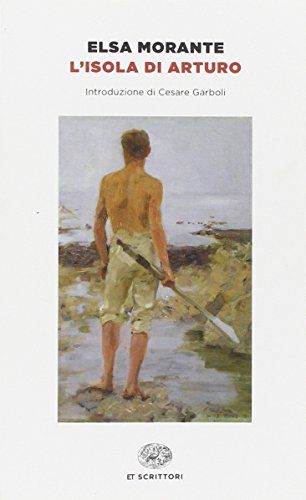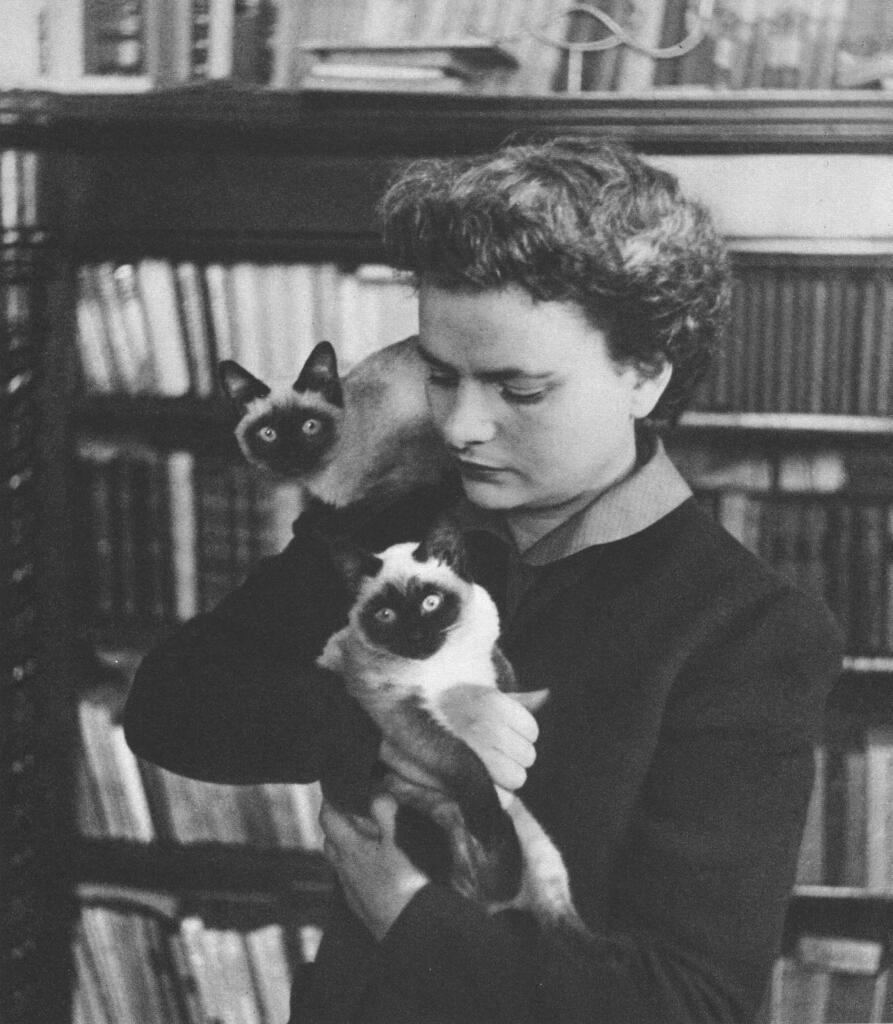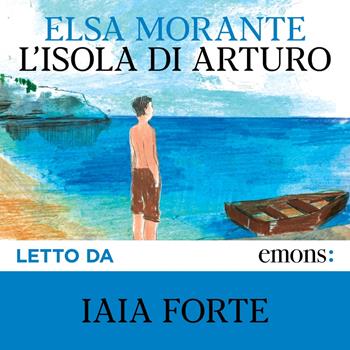Every book takes care of us in its own way. Reading or re-reading Arturo’s Island, a novel suitable for both teenagers and adults, offers an intimate and passionate fresco on the right to love and be loved. The young protagonist Arturo cries out to the world about the sense of impotence and injustice in the face of the great pain of abandonment and loneliness. A “necessary” book, a masterpiece that illuminates multiple themes such as illusions, ignorance, injustice, mystery, pain, love, research, conscience, and growth, which represent the crucial stages of an intense inner journey.
HUGE ELSA MORANTE
The novel by Elsa Morante, the first woman in history to win the Strega prize in 1957 with this masterfully moving, even poignant, prose work is descriptive and introspective. The psychological traits of the characters are described with skill through images and sensations between fairy tales and mythology, starting from the name of the protagonist. Arturo conveys empathy because the author’s pen makes a miracle: the clear and detailed storytelling has an elegant style and wraps up the reader into this fascinating history.
“Uno dei miei primi vanti era stato il mio nome. Avevo presto imparato (fu lui, mi sembra, il primo a informarmene), che Arturo è una stella: la luce più rapida e radiosa della figura di Boote, nel cielo boreale! E che inoltre questo nome fu portato pure da un re dell’antichità, comandante a una schiera di fedeli: i quali erano tutti eroi, come il loro re stesso, e dal loro re trattati alla pari, come fratelli…Ma un altro motivo, tuttavia, bastava lo stesso a dare, per me, un valore araldico al nome Arturo: e cioè che a destinarmi questo nome (pur ignorandone, credo, i simboli titolati) era stata, così seppi, mia madre. La quale in sé stessa non era altro che una femminella analfabeta; ma più che una sovrana per me.”
THE ITALIAN ROBINSON CRUSOE
The daily facts are described through the great evocative power of the moods of the various characters. Primarily those of the restless adolescent protagonist/hero of this Bildungsroman. Nothing unites Arturo, the Italian Robinson Crusoe, with the other characters. Motherless and essentially abandoned by his father, he is a lively and curious child, in him passion and enthusiasm for life and people prevail, despite the deep pain that oppresses him. Running around on the island, he idealizes his father, he fully enjoys absolute freedom together with total solitude in the discovery of life. With the passing of a few years, those ranging from childhood to adolescence of the protagonist, Arturo makes some awkward experiences of love and we witness his great inner change. From a primordial limbo, we arrive at the phase of awareness and disillusionment.
The reader ends up understanding Arturo’s gestures of rebellion. Even when he feels nostalgic for the idea of the past that he had built despite the disappointing evidence. The boy arouses empathy because the author’s pen performs a great miracle: the detailed and clear narrative with a clean and elegant style envelops the reader in the folds of this bewitching story.
“E immediatamente mi rendevo conto che in realtà non c’era stato nulla, né frastuoni né terremoti; era il dolore, che usava quegli artifici maligni per tenermi sveglio e non lasciarmi mai. Esso non mi lasciò mai, difatti, per tutta la giornata! Era la prima volta, da quando vivevo, che conoscevo veramente il dolore.“
THE ADULTS: ONE IN A THOUSAND MAKES IT
Even the moods of the adults around Arturo, characters at times questionable, are described effectively and precisely.
The male figures mostly have a negative connotation starting from the father, Wilhelm Gerace, detached and misogynistic, with ambiguous sexuality and feelings. Arouses anger to read of his ineffective character and constant absences, of his implacable indifference in front of his son and his new young wife, both left to their own devices.
“Mio padre non scriveva mai lettere, non faceva mai sapere sue notizie, né mandava nessun saluto. Ed era favolosa per me la certezza che pure egli esisteva, e che ogni istante da me vissuto a Procida, lo viveva lui pure in chi sa quale paesaggio, in chi sa quale stanza, fra compagni stranieri che io consideravo gloriosi e beati solo perché stavano con lui (non dubitavo, difatti, che la frequentazione di mio padre fosse il titolo di aristocrazia più ambito per tutte le società umane).“
The Amalfitan, owner of the Casa dei Guaglioni, with his misogyny, throws the roots of the Gerace family, seems to give a definitive imprint to history, a perpetual condemnation. Even Carmine, the half-brother born from his father’s new union with Nunzia, has stolen from Arturo, at least so the protagonist thinks, that alms of attention and love that he had left. Only the nurse Salvatore has the ability to look after and keep precious saving feelings in his heart.
The women in the novel are a fresco full of nostalgia and restlessness. The mother died in childbirth and the protagonist will nourish nostalgia and idealization for her. Nunzia, the new wife of her father, becomes the bearer of an unaware, fragile, and submissive feminine, but also of the unexpressed love passion, which is born for the first time in Arturo. The other women of the island, mostly marginal, have a specific function as Assunta, Arturo’s lover, and the midwife who carries life and death in the protagonist’s heart.
“Dalle altre femmine, un o può salvarsi, può scoraggiare il loro “amore”; ma dalla madre chi ti salva? Essa ha il vizio della santità… non si sazia mai di espiare la colpa di averti fatto, e, finché è viva, non ti lascia vivere, col suo amore.”
“Nessun affetto nella vita uguaglia quello della madre.”
THE ISLAND AND THE SEA
The island of Arturo, Procida, is an archipelago of vines. It is the physical place, for a long time the only possible place, but also the cradle of his ingenuity, the mother he never knew and the one he acquired, and the father, undeservedly mythologized. It is Eden, which leads from adolescence to adulthood when he finally feels ready to go and conquer his future. It is a place of limit like the columns of Hercules, but the sea around the island is also a place of conquest, which will push it elsewhere, in search of the truth.
“Spesso certi nostri affetti, che presumiamo magnifici, addirittura sovrumani, sono, in realtà, insipidi; solo un’amarezza terrestre, magari atroce, può, come il sale, suscitare il sapore misterioso della loro profonda mescolanza! Per tutta la mia infanzia e fanciullezza, io avevo creduto di amare W. G.; e forse m’ingannavo. Soltanto adesso, forse, incominciavo ad amarlo. Mi accadeva qualcosa di sorprendente, che certo in passato non avrei potuto credere, se me l’avessero predetta: W. G. mi faceva compassione.“
Reading this novel, one cannot help but confront the protagonist’s illusions and flights of fancy, through which freedom is savored as a temporary lifesaver. This attitude is very common, especially at an early age, except to discover that the passage through pain, nostalgia, and disillusionment, however, is the only way to overcome difficulties, evolve and grow. The sea, symbol par excellence of the water element, emblem of the feminine principle, and vital rebirth, is the means that takes you elsewhere. It takes courage and honesty with yourself and with others to meet the new world that awaits.
“Presto, ormai, per me, incomincerebbe finalmente l’età desiderata in cui non sarei più un ragazzino, ma un uomo; e lui il mare, simile ad un compagno che finora aveva sempre giocato assieme a me, mi porterebbe via con lui, a conoscere gli oceani, e tutte le terre, e tutta la vita!”
Thanks to the fascination that the first reading had involved me, I nourished the desire to read it again. Listening to this novel on Audible through the persuasive voice of Iaia Forte was a doubly immersive sensory and emotional experience. In 19662 a movie was filmed by this novel, with Damiano Damiani as Director. Happy reading and happy listening.

Elena Cattaneo was born in Cremona and lives in Rome. As a teacher, editor and web reporter she looks at this city, even also many years, like a curious turist.
After a Foreign Language University Degree she specialized in Communication Science. She fully dedicated to Business Communication, her most relevant interest.
She cultivated several cultural hobbies, fond of art and human being expression.



